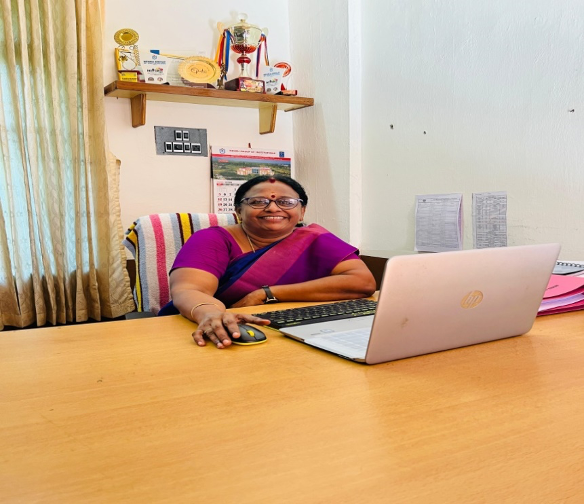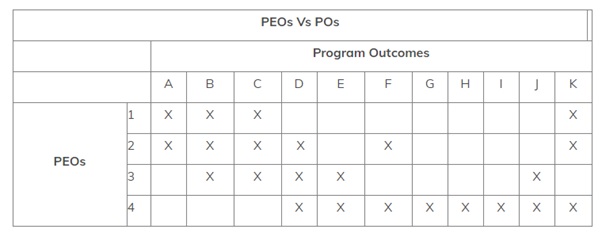About
The Department of ECE was established in 2002 with an intake of 60 students for undergraduate (B.Tech) programme and enhanced to an intake of 120 students from 2006. The ECE department formally inaugurated the ECHOS (The ECE Association) in 2009 and under this banner many extra-academic activities have been conducted such as paper presentation, quiz competition, workshops and seminars. Department is closely associated with INSTITUTE OF ELECTRONICS AND TELECOMMUNICATION ENGINEERS (IETE) Palakkad Centre to organize technical events like guest lecture, seminars and conferences
The department offers one Postgraduate (M.Tech) programme, namely, “ VLSI” from 2012 with an intake of 18.
Department has well-equipped laboratories in the areas of Electronics, Communication, IoT & VLSI. The department is committed to educate students about professional and ethical responsibilities and train them to build life skills for their career development.
Further, the students of the department are encouraged to take up in-plant trainings, summer internships and project work at industries and the department ensures that all students who are eligible are placed on campus.
Vision of the institute
To mould true citizens who are millennium leaders and catalysts of change through excellence in education.
Mission of the institute
NCERC is committed to transform itself into a center of excellence in Learning and Research in Engineering and Frontier Technology and to impart quality education to mould technically competent citizens with moral integrity, social commitment and ethical values.
We intend to facilitate our students to assimilate the latest technological know-how and to imbibe discipline, culture and spiritually, and to mould them in to technological giants, dedicated research scientists and intellectual leaders of the country who can spread the beams of light and happiness among the poor and the underprivileged.
HoD’S MESSAGE

Dr. Mredhula. L
M.TECH, Ph.D
Professor & Head
I welcome you to NCERC, dedicated to ensuring great careers for our students. We are forging deeper industry linkages, creating an academic and research culture from Starting day and assuring the seamless education using the state of art technology available.
We have invested a great deal of time and energy in creating strong foundations for our department and will continue to do all that it takes to ensure the bright career opportunities through placement-focused studies for our student.
The excellent infrastructure, well experienced teaching faculty of the best kind of the Department ensuring quality education such as interaction among students, parents and staff, along with a Training and Placement Cell ensures a bright future to its students.
I wish to appreciate the team of faculty members and the students for their brilliant and tireless efforts. Depending upon the interest of the student, he/she may choose to go for higher studies or employment and can choose to do research & development, design, production, application, testing, or management in the Information Technology industry. We strongly encourage innovation in research, in teaching and in service to the profession, the local community and industry. I wish all the students and faculty a good academic career.
Sincerely, and with best wishes,
VISION
A leading Center of Excellence in Electronics and Communication Engineering, empowering ethical professionals to apply advanced, industry-relevant knowledge for sustainable societal and industrial impact.
MISSION
- Provide quality education in Communication Systems, integrating technical excellence with ethical and social responsibility.
- Promote research and innovation in emerging technologies aligned with industry needs.
- Foster entrepreneurship and collaborative learning through academia-industry partnerships.
- Develop sustainable, inclusive engineering solutions that address real-world challenges and uplift communities.
PROGRAM EDUCATIONAL OBJECTIVES (PEO’S)
- PEO1: To produce graduates with strong technical expertise and ethical responsibility who excel in professional environments or pursue higher education with a commitment to quality and integrity.
- PEO2: To produce graduates capable of engaging in research and innovation by applying emerging technologies to solve complex problems aligned with evolving industry and societal needs.
- PEO3: To produce graduates who exhibit leadership, teamwork, and entrepreneurial skills, enabling collaborative learning and partnerships with industry and academia for societal impact.
Mapping of PEOs with the Program Outcomes (POs)
The Electronics and Communication Engineering Program outcomes leading to the achievement of the objectives can be summarized in the following Table.

PROGRAM OUTCOMES (PO’S)
- Engineering Knowledge:Apply the knowledge of mathematics, science, engineering fundamentals, and an engineering specialization to the solution of complex engineering problems.
- Problem Analysis: Identify, formulate, research literature, and analyze complex engineering problems reaching substantiated conclusions using first principles of mathematics, natural sciences, and engineering sciences.
- Design/development of Solutions:Design solutions for complex engineering problems and design system components or processes that meet the specified needs with appropriate consideration for the public health and safety, and the cultural, societal, and environmental considerations.
- Conduct Investigations of Complex Problems: Use research-based knowledge and research methods including design of experiments, analysis and interpretation of data, and synthesis of the information to provide valid conclusions.
- Modern Tool usage: Create, select, and apply appropriate techniques, resources, and modern engineering and IT tools including prediction and modeling to complex engineering activities with an understanding of the limitations.
- The Engineer and Society: Apply reasoning informed by the contextual knowledge to assess societal, health, safety, legal, and cultural issues and the consequent responsibilities relevant to the professional engineering practice.
- Environment and Sustainability: Understand the impact of the professional engineering solutions in societal and environmental contexts, and demonstrate the knowledge of, and need for sustainable development.
- Ethics: Apply ethical principles and commit to professional ethics and responsibilities and norms of the engineering practice.
- Individual and Team Work: Function effectively as an individual, and as a member or leader in diverse teams, and in multidisciplinary settings.
- Communication: Communicate effectively on complex engineering activities with the engineering community and with society at large, such as, being able to comprehend and write effective reports and design documentation, make effective presentations, and give and receive clear instructions.
- Project Management and Finance: Demonstrate knowledge and understanding of t h e engineering and management principles and apply these to one’s own work, as a member and leader in a team, to manage projects and in multidisciplinary environments.
- Life-long Learning: Recognize the need for, and have the preparation and ability to engage in independent and life-long learning in the broadest context of technological change.
PROGRAM SPECIFIC OUTCOMES (PSO’S)
- PSO1: Apply the concepts of Electronics, Communications, Signal Processing, VLSI, Control Systems etc., in the design and implementation of Engineering Systems.
- PSO2: Solve complex Electronics and Communication Engineering problems, using latest hardware and software tools, either independently or in team.